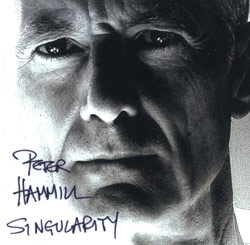
If you only associate Peter Hammill with the seminal prog band Van der Graaf Generator then you're missing one of the 21st century's most prolific and interesting song-writers. With more than 40 albums as a solo artist, Hammill has engaged in vast explorations of the potential of the song and the place that the voice holds within it. Through his career he has honed a multi-layered approach to singing that has reached a level of exquisite subtlety. In any given song he harmonizes, counterpoints and comments on his lyrics with an immense bag of tricks, from lovely angelic voices of countless layers to taunting fragmented retorts. He is also a talented multi-instrumentalist and recording artist, and this album is pure Hammill, as he sung, played, recorded, processed and produced the album. Little wonder in 2004 that he was awarded the prestigious Italian Tenco Prize for song-writing.
To consider this album a "prog" record would miss the mark. In fact, Hammill states that the instrumental texture of the recordings are relatively simple, and that he was "keen to find some new wrinkles in my musical landscape". This is clearly essential to Hammill, as he searches within himself to avoid repetition, to find new modes of expression, and most importantly, to ensure that his songs express their intention in their intended ways. Singularity is an important record for Hammill, his first solo studio album after his own 'singularity,' a near-fatal heart attack around the time of his 2004 release Incoherence. In characteristic fashion, he wanted to write about the experience, but also wanted to give enough time to reflect on the experience. "Event Horizon" is that song, a uniquely haunting piece with a narrative quality that describes both the physical events and the emotional experience; his comments about the song on his own Sofa Sound website are fascinating, and explain the significance of both the 'singularity' and his own 'event horizon.' The song uses a guitar figure that recall his "Far-Flung (Across the Sky)" but takes the listener into a dazed and stuttering rhythm as Hammill confusedly looks across 'the line.' His literate lyrics are neither pretentious nor pandering, and it the very human nature of his experience that ultimately make his work so rewarding: Hammill the thinking man who describes and expresses what he sees with depth and consideration, translating the mundane to epic in short episodes.
There are 3 'rockers' on the album, the opener "Our Eyes Give It Shape", a suprisingly intricate song that may take a couple of listens to grasp; the cynical "Famous Last Words", a piece with themes about pretense and the effect of words (a recurring subject in his work), with an ending sure to reach out to listeners of his great Black Box release, and an opaque emotional blast, and the heaviest and most wrenching song of the album, the vituperative "Vainglorious Boy." Those more energetic songs are balanced by the poetic "Naked to the Flame," a gentle acoustic song critical of the iconic nature of ambition and celebrity. "Meanwhile to My Mother" is an agonizingly tender piece written to Hammill's mother as she lapsed into her own world before passing on; the music here creates a stark lullaby that is so naked and plaintive as to be disarming, but yields to sincere tenderness and concern. Two pieces make up his ode to, of all unlikely subjects, his former piano tuner, who died on a Friday afternoon in a collision with a drunk driver after visiting Hammill to tune his piano. The instrumental "Of Wire, Of Wood", a piece in the style of his Loops and Reels work, introduces the motifs for "Friday Afternoon", which tells the dual stories of the tuner and the drunk, in a minimum of words implying the respective depth and shallowness of each, and the stupidity and senselessness of it all. "White Dot" takes us out of the singularity, an experimental piece using layered voices and reversing guitar snips around a series of philosophical and paradoxical observations:
"Nothing is like everything else,
like anything you name.
Pomposity unpunctured,
we're approaching a velocity of escape from our mortal frames."
Comments and Feedback:
|



